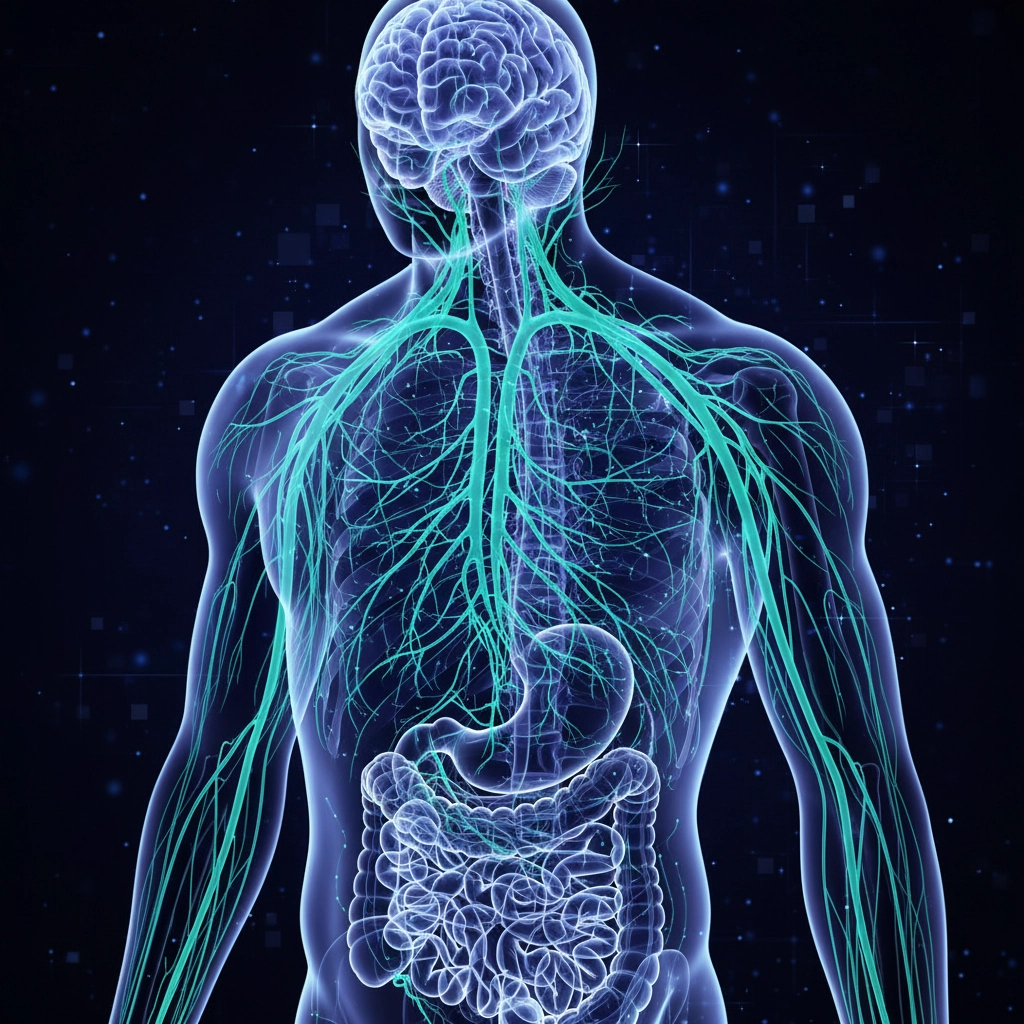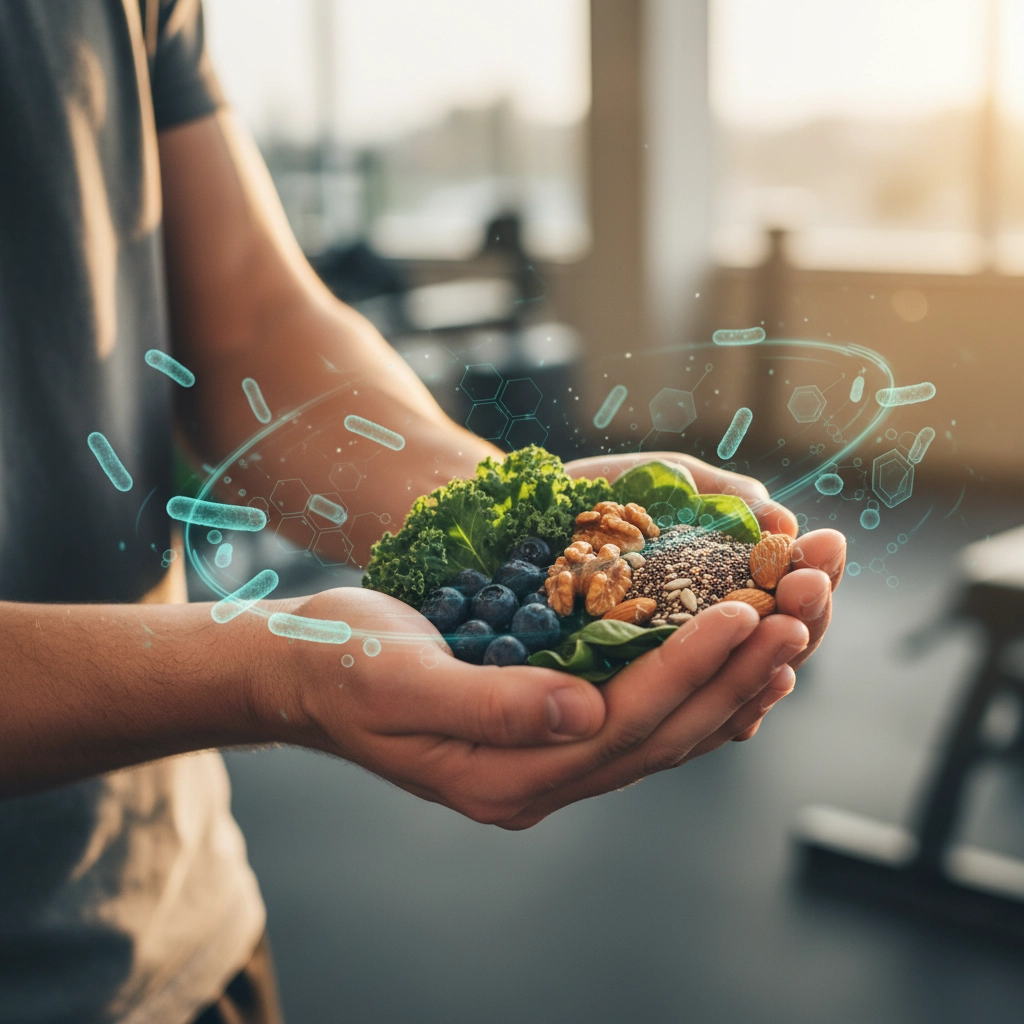Your high school coach spends hours perfecting your form, drilling plays, and tracking your speed times. But there's one performance enhancer hiding in plain sight that most coaches completely ignore: and it's literally in your gut.
While traditional coaching focuses on visible metrics like strength and endurance, cutting-edge sports science reveals that your digestive system operates as a "second brain" that directly controls mental focus, reaction time, and athletic performance. The trillions of microorganisms living in your gut are constantly manufacturing chemicals that either boost or sabotage your game-day performance.
Here's what every student-athlete needs to know about the gut-brain connection and why understanding it could be your secret weapon on the field.
Your Gut Is Actually Your Second Brain
The relationship between your digestive system and brain goes far beyond just feeling nervous butterflies before a big game. Scientists have discovered that your gut contains its own nervous system called the enteric nervous system: so complex that researchers literally call it your "second brain."
This isn't just a catchy nickname. Your gut contains over 500 million nerve cells, which is more than your spinal cord. These cells form a neural network that communicates directly with your brain through the vagus nerve, creating a constant two-way information highway.

But here's the kicker: your gut does most of the talking. It sends far more signals to your brain than your brain sends back. That means the state of your digestive system is constantly influencing your mental clarity, mood, and physical performance: whether you realize it or not.
The communication happens through three main pathways:
Neural connections through the vagus nerve
Chemical messengers via neurotransmitters produced in your gut
Hormonal signals that affect your entire body
This means what you eat and how well your gut functions doesn't just affect digestion: it reverberates through every aspect of your athletic performance.
How Poor Gut Health Sabotages Your Performance
Research reveals something that might surprise you: psychological stress impacts gut health more severely than any form of physical training stress. That pre-game anxiety you feel? It's not just mental: it's literally damaging your gut barrier and compromising your performance capacity.
When chronic stress weakens your gut lining, bacterial toxins can leak into your bloodstream, triggering inflammation throughout your body. This inflammatory response creates what athletes often describe as "brain fog": that frustrating inability to think clearly and react quickly during crucial moments.
Athletes with compromised gut health commonly experience:
Difficulty maintaining focus during games
Reduced energy levels that don't match their training
Frequent illness that sidelines them during important seasons
Slow recovery times between training sessions
Mental fatigue that affects decision-making
The gut microbiome produces neurotransmitters that directly regulate your mood and mental state. When these beneficial bacteria are out of balance, they essentially sound an alarm to your brain that something is wrong, creating metabolic noise that makes peak performance nearly impossible.
The Performance Chemicals Your Gut Manufactures
Your gut bacteria aren't just along for the ride: they're actively manufacturing performance-enhancing compounds that most athletes have never heard of. These microorganisms digest the fiber you eat and convert it into short-chain fatty acids (SCFAs) like butyrate, propionate, and acetate.
These aren't just digestive byproducts. SCFAs actively affect brain function by:
Regulating appetite and energy levels
Forming and maintaining the blood-brain barrier that protects your brain
Reducing inflammation throughout your nervous system
Supporting the production of key neurotransmitters

Your gut bacteria also metabolize amino acids and bile acids to create chemicals that influence cognitive function, reaction time, and mental resilience. When your gut microbiome is thriving, you're literally manufacturing your own natural performance enhancers.
But when your gut barrier becomes compromised, harmful substances like lipopolysaccharide (LPS) can enter your bloodstream. This bacterial toxin has been linked to depression, cognitive decline, and other brain disorders that would devastate any athlete's performance potential.
The Nutrition Blueprint for Peak Gut-Brain Performance
Most high school nutrition advice focuses on macronutrients: protein for muscle building, carbs for energy. But optimizing the gut-brain connection requires a more sophisticated approach that feeds your beneficial bacteria while supporting neural communication.
Omega-3 Fatty Acids: Found in fatty fish like salmon, sardines, and mackerel, omega-3s exist in high concentrations in brain tissue and have been shown to increase beneficial gut bacteria populations. These fats support both brain cell structure and the microbial ecosystem that produces performance-enhancing compounds.
Fermented Foods: Yogurt, kefir, sauerkraut, kimchi, and other fermented options contain live beneficial bacteria that can colonize your gut and directly alter brain activity. Studies show that regular consumption of fermented foods improves both cognitive function and stress resilience.
High-Fiber Foods: Whole grains, nuts, seeds, fruits, and vegetables provide prebiotic fibers that serve as fuel for your beneficial gut bacteria. Research indicates that specific prebiotics can actually reduce stress hormone levels: crucial for athletes dealing with competitive pressure.
Polyphenol-Rich Foods: Dark chocolate, green tea, olive oil, and coffee contain plant compounds that gut bacteria convert into cognitive enhancers. These foods provide dual benefits by supporting both gut health and direct brain function.
Tryptophan Sources: Turkey, eggs, and cheese are high in tryptophan, an amino acid that gets converted into serotonin: the neurotransmitter that regulates mood, sleep, and mental state. Adequate tryptophan supports optimal neurotransmitter production in both your gut and brain.
Why Your Coach Isn't Talking About This
Traditional coaching focuses on measurable, immediate results. Coaches can time your 40-yard dash, count your reps, and track your wins and losses. The gut-brain connection operates more subtly, affecting performance through reduced inflammation, improved nutrient absorption, enhanced mental clarity, and better stress response.
These benefits develop gradually and require consistent dietary habits rather than intense training sessions. In a coaching culture that emphasizes dramatic, immediate improvements, gut health gets overlooked because its effects are cumulative rather than explosive.

Additionally, many coaches simply aren't trained in sports nutrition beyond basic macronutrient recommendations. The gut-brain connection represents cutting-edge sports science that hasn't yet filtered down to most high school programs.
But here's the reality: while your competitors are focusing solely on traditional training metrics, understanding and optimizing your gut health gives you a significant competitive advantage that most athletes are completely missing.
Putting This Knowledge Into Action
Start by tracking how different foods affect your energy levels, mental clarity, and overall performance. Keep a simple food and performance journal for two weeks, noting what you eat and how you feel during training and games.
Focus on gradually increasing your intake of the gut-brain supporting foods mentioned above. Don't overhaul your entire diet overnight: sustainable changes happen incrementally.
Pay attention to your stress management strategies. Since psychological stress damages gut health more than physical stress, developing mental resilience directly supports your gut-brain axis. Consider techniques like meditation, deep breathing, or visualization that successful athletes use to manage competitive pressure.
Remember that your gut-brain connection is constantly adapting based on your choices. Every meal is an opportunity to either support or sabotage your performance potential through the most powerful neural network most athletes never think about.
The student-athletes who understand and optimize this connection will have a significant advantage over competitors who focus solely on traditional training methods. Your gut truly is your second brain: it's time to start feeding it like the performance powerhouse it actually is.
At Recruit My Game, we believe in giving student-athletes every possible advantage in their recruiting journey. While coaches focus on the fundamentals, understanding advanced performance optimization strategies like the gut-brain connection can set you apart from the competition and help you perform at your peak when it matters most.


